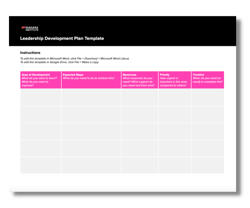11 min read
What is Leadership Training for Managers?
The fact is that managers who receive little to no leadership training and lack the skills they need to lead effectively are costly. Gallup estimates...
.png)
There is a great debate: Are leaders made or born?
While some people have natural leadership qualities, all new managers can benefit from leadership training to acquire the skills a leader needs. In fact, research from Gallup found that “two in 10 people exhibit some characteristics of basic managerial talent and can function at a high level if their company invests in coaching and developmental plans for them.”
The research is clear leaders are made, not born, and organizations must teach leadership to new managers if they want them to succeed.
If you’re looking for a roadmap for teaching leadership to new managers, you’ve come to the right spot. In this article, we will provide the steps to follow, suggestions for leadership training for managers, and valuable tools and templates to make the process as easy as possible.
As Benjamin Franklin once said, “If you fail to plan, you are planning to fail.” That’s why the first step in teaching leadership to new managers is to create a plan that focuses on the unique development needs of each manager. If you’re a leader making a plan for your new managers, or you're a new manager yourself, here are four ways to create a solid foundation for leadership training.

Uncovering areas of strengths and weaknesses through administering an assessment such as 180 or 360-degree feedback and completing a skills gap analysis is a foundational component of building an individualized development plan.

While the intentions of a 30-60-90-day plan for a new leadership role are not for identifying leadership skills, outlining what will be done in the first 90 days of being a new manager will highlight new role responsibilities requiring skill development.

What do you want to accomplish as a manager? Evaluating where you are today and developing a leadership vision of what you want to do will start you on a path of success by identifying your goals and helping you create an action plan to achieve them. For new managers, a significant component of the action plan will likely include developing skills that are needed to activate your goals, which can be incorporated into your leadership development plan.
 Define a Leadership Development Plan
Define a Leadership Development PlanNow that you’ve identified your strengths and weaknesses, the actions you’ll take in your first 90 days as a new manager, and your leadership goals, it’s time to put it all together in a leadership development plan. A leadership development plan is a “written document that outlines the skills, competencies, and knowledge a leader needs and the plan for how they will acquire those things.” To make it easy, we’ve created an editable template so you can get started right away.
With your development plan in hand, it’s now time to acquire new leadership skills. Here are five common ways to teach leadership to new managers.
Leadership training for managers can take on many different forms depending on the skills each manager needs to develop. It could be focused training, such as communication training for leaders, or more broad, comprehensive leadership training, like that found in Niagara’s Institute’s Leadership Fundamentals, which is specifically designed for new managers.
An excellent way to teach leadership to new managers is to learn from someone who’s been there. Matching an experienced leader with a new manager so they can receive personalized guidance, advice, and have a safe space to discuss challenges is an excellent compliment to more formal leadership training.
When the needed leadership development is more nuanced than what is available in a leadership program, working with a leadership coach is a great option. These one-on-one coaches specialize in helping new managers gain greater self-awareness, achieve development objectives, and overcome any weaknesses holding them back.
Pairing a leadership program with opportunities for managers to apply their new leadership skills through on-the-job training is an excellent way to promote learning by doing, skill retention, and application. Take it one step further by assigning them progressively more challenging tasks and responsibilities to gain new skills and practice them in real-world scenarios.
Having new managers shadow and observe senior leaders, attend meetings, and observe them in action can be an invaluable learning experience. The first-hand experience, followed by a debrief from the leader, offers valuable insights into what it takes to be a successful leader.
Leadership development is an ongoing process. As John F. Kennedy famously said, “Leadership and learning are indispensable to each other.” To keep on learning, new managers should embrace a growth mindset, be open to feedback, and actively seek opportunities for skill enhancement and refinement. Here are five ways to do just that.
Initiating regular meetings with a small group of new managers is an excellent way for them to learn from each other. During the time together, collective learning takes place as new managers share their experiences, receive input and feedback, and exchange what is working well and where they’ve hit roadblocks.
Encourage new managers to read leadership articles to deepen their knowledge. Create a live document so new managers and those overseeing them can share reading materials, articles, podcasts, guides, blogs, videos, and tools on leadership topics. To jump-start your list, check out Niagara Institute’s leadership blogs, guides, quizzes, and toolkits.
The very best leaders always continue learning and honing their leadership skills by reflecting on their leadership experiences, learning from mistakes, and continuously refining their skills. New managers will significantly benefit from doing the same.
Hand in hand with a new manager committing to continuous improvement, their direct leader should also be committed to their ongoing development. They should be available to provide coaching and constructive feedback when their new manager encounters leadership challenges or achieves a milestone. Their advice, suggested strategies, encouragement, and kudos will go a long way in helping new managers navigate leadership situations.
Now that the new manager has been in the role for a while, incorporating leadership competencies into performance reviews, providing constructive feedback against them, and creating new development plans to address skill gaps will help them continue to grow as leaders.
.png)
11 min read
The fact is that managers who receive little to no leadership training and lack the skills they need to lead effectively are costly. Gallup estimates...
%20(1).png)
5 min read
The options seem endless when it comes to leadership training.Conducting a quick Google search for “manager training program” produces roughly one...

6 min read
When you think about career success, whether it is a person you look up to or achievement in an organization, it usually is someone in a leadership...